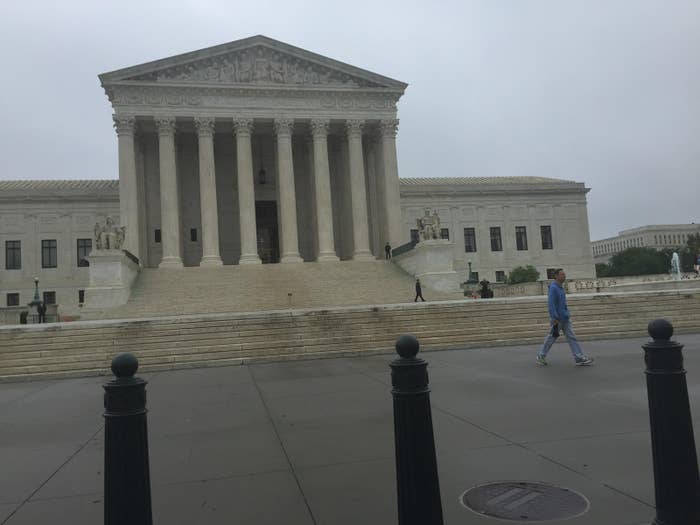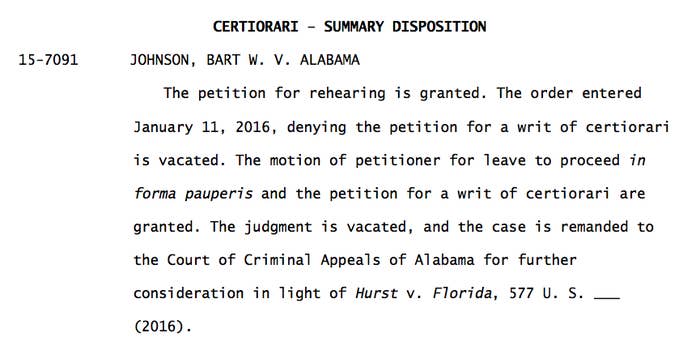
WASHINGTON — The Supreme Court on Monday sent an order to the Alabama courts that they review whether the process the state uses to sentence someone to death remains constitutional after a ruling from the justices earlier this year that struck down Florida's similar sentencing process.
Also on Monday, the Supreme Court declined to hear a California death penalty case. The action in Bart Johnson's case in Alabama, however, is a sign that the justices are paying close attention to the state-by-state effects of their movements on capital punishment.
In the California case, the justices declined — over the noted dissent of Justice Stephen Breyer — to hear a challenge on whether decades-long delays in executions can lead to a violation of the Constitution. Breyer, who has repeatedly raised concerns about the death penalty more broadly and the potential constitutional implications of delays, drew significant attention to the California case with his dissent.
But it is Johnson's case that could, ultimately, serve as a much stronger signal of where the Supreme Court stands on capital punishment issues today.
On Jan. 11, the court had denied certiorari in Johnson's case, refusing to consider a question about whether prejudicial media coverage relating to the killing at issue required the court to grant a change of venue for Johnson's trial.
The next day, though, the court struck down Florida's death sentencing scheme — in which juries made a recommendation, but the judge was responsible for deciding the sentence. In Hurst v. Florida, Justice Sonia Sotomayor wrote for the court, "The Sixth Amendment requires a jury, not a judge, to find each fact necessary to impose a sentence of death. A jury’s mere recommendation is not enough."
Alabama’s death sentencing scheme is similar to Florida’s, though not precisely the same. (The court previously had upheld Alabama's law, but it had done so by relying on two cases out of Florida that were overturned in part by the Hurst decision.) Soon after the Hurst decision, three justices — Sotomayor, Breyer, and Ruth Bader Ginsburg — signaled that they believed Alabama's system was thrown into question by Hurst.
On Feb. 5, Johnson's lawyers asked the court to consider rehearing his case. "These same Sixth Amendment concerns [at issue in Hurst] require action in Mr. Johnson’s case—a case in which the judge made the findings necessary to impose the death penalty," the lawyers wrote.
Lawyers for the state opposed the request. They argue that Alabama's scheme is different from Florida's scheme because the law in Alabama "requires a jury to unanimously find the existence of an aggravating circumstance — at either the guilt phase or the sentencing phase — before a defendant can be sentenced to death."
The court rarely rehears cases ever, let alone cases in which it had denied the request to hear the case in the first place. But the court did so on Monday, despite the state’s opposition, taking the precise actions that were sought by Johnson's lawyers, led by Randall Susskind at the Equal Justice Initiative.
The court granted the rehearing request, and then granted the certiorari petition, vacated the Alabama court decision below, and sent the case back to the Court of Criminal Appeals of Alabama "for further consideration in light of Hurst v. Florida."
While the request might not seem like much, it means that a majority of the eight justices on the court — so, at least five — decided that Hurst — itself an 8-1 decision only opposed by Justice Samuel Alito — likely has implications for Alabama's death sentencing scheme.
This is made all the more significant in light of the court's current slowdown in accepting new cases, an issue detailed by Robert Barnes in The Washington Post on Sunday. The court took no action, for example, on two other death penalty-related petitions under review out of Texas: one case challenges the state's standards for determining intellectual disability, the other challenges the appeals court's standard for review of constitutional challenges to trial procedures in death penalty cases.
Monday's order in Johnson's case also could signal that other states with similar elements to their sentencing scheme — including Delaware, Montana, and Nebraska — could face additional scrutiny in the federal courts. Delaware's Supreme Court already is reviewing its state's sentencing scheme in light of the January ruling.
The Supreme Court's order in Johnson v. Alabama:

